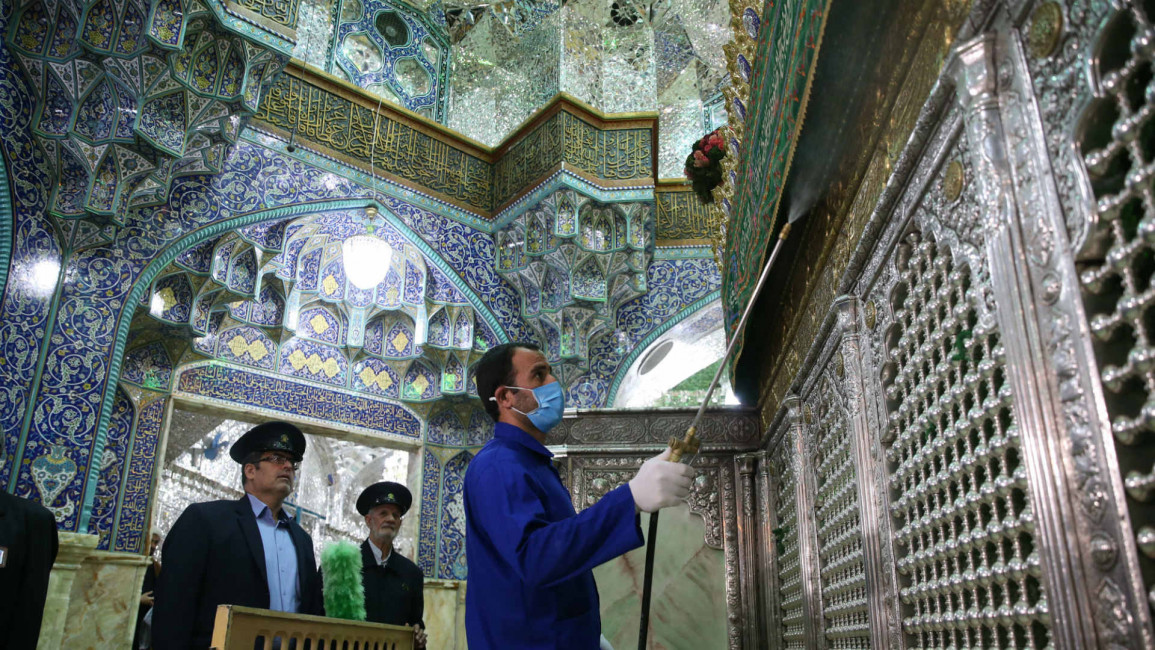Iran arrests 'shrine licker' who defied coronavirus measures
In a viral video, Jafar Ghafouri appeared to lick the metal gating surrounding the tomb of Imam Reza in Mashhad, saying, "I am eating the virus to reassure you and keep you coming to the mausoleum".
Ghafouri, an activist of a branch of Shia Islam that rejects the Islamic Republic, has since been arrested, AFP reported citing several Iranian news outlets.
The activist does not appear to have been the only Iranian to engage in the bizarre practice.
A video shared on social media over the weekend showed three people, one of them a child, licking the glass coverings and metal grilles at shrines in Qom and Mashhad.
"I'm licking this and I don't care what happens," another man is shown saying, before licking a metal grille housing a prominent grave site.
The Islamic Republic has had the deadliest outbreak of the virus, also known as COVID-19, outside of its epicentre in China.
At least 66 people have died from the new coronavirus so far, with more than 1,000 cases confirmed across the country.
Hated religious debate
The outbreak has sparked intense debate between ultra-conservative Shia clerics and the government.
"This is a historic debate between Muslim jurists that dates back to the early days of Islam," Mohsen Alviri, an academic and theologian from Qom, told AFP.
"Some people prioritise religious rituals, which they place above everything, even medical science," said the hodjatoleslam, or middle-ranking cleric.
|
|
Others "think we can abandon obligatory prayers to save a human being's life," he added.
Ayatollah Mohammad Saidi, head of the Fatima Masumeh mausoleum in Qom, insisted last week that places of worship should remain open despite the outbreak.
"This sacred shrine [is] a house of healing," he said, inviting pilgrims to come so that they can be "healed of their physical and spiritual illnesses".
Two days earlier, Qom's top security body had ordered the suspension of collective prayers in the province.
It also ordered a deep clean of the mausoleum and the installation of barriers to keep people back from a tomb whose ornate silver-plated enclosure is usually touched or kissed by the faithful.
An article published a few hours later on the mausoleum's website criticised the decision as "an error based on lack of faith".
The article repeatedly referred to what it presented as "the antibacterial effects of silver".
Health Minister Saeed Namaki later announced restrictions on the entry to Shia holy sites.
Under the government's new guidelines, worshippers would only be allowed to enter pilgrimage sites if they had hand sanitising liquid and masks, and as long as they avoided close contact with each other and simply prayed before leaving.
Authorities also took the rare decision to cancel Friday prayers in Tehran and other cities, including Mashhad, an important pilgrimage site.
Communal prayers conducted at noon on Fridays are considered to be obligatory for male Muslims.
The decision to cancel what many consider an irrefutable religious duty has sparked disagreement among clerics.
"Nothing justifies the closure of this divine duty," Ayatollah Ahmad Alamolhoda, an imam who leads prayers in Mashhad, was quoted as saying by state news agency IRNA.
But one hodjatoleslam has a different opinion.
"If specialist doctors recommend collective prayers should be temporarily suspended or that attendance at religious sites should be reduced, then this should be adhered to," Mohammadreza Zaeri said.
"If someone were to be contaminated by [a cleric's] negligence, then [this cleric] would certainly be religiously responsible," Zaeri said on the messaging service Telegram.
In Qom, Grand Ayatollah Safi Golpayegani issued a fatwa on Saturday calling on the population to "take into account" the health ministry's recommendations.
Since it first emerged in China late last year, the novel coronavirus has spread to more than 60 countries and infected nearly 90,000 people and killed more than 3,000.
 |
Agencies contributed to this report
Follow us on Facebook, Twitter and Instagram to stay connected



